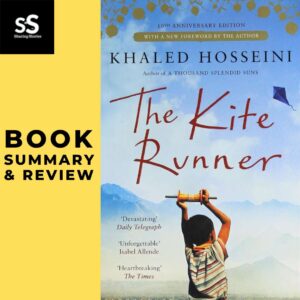Book review of the kite runner
The Kite Runner by Afghan-American author Khaled Hosseini is a poignant novel that explores themes of betrayal, redemption, and friendship. Published in 2003, the book has garnered critical acclaim for its compelling narrative and emotional depth.
Brief Summary: The story follows the protagonist Amir, who grapples with guilt and seeks redemption for betraying his childhood friend Hassan.
Author’s Background: Khaled Hosseini, born in Kabul, draws upon his Afghan heritage and personal experiences to create a vivid portrayal of Afghan culture and history.
Publication Information: The Kite Runner was Hosseini’s debut work, propelling him to international literary fame.

Table of Contents
Plot Summary of The Kite Runner
The plot of The Kite Runner revolves around the complex dynamics of friendship, family, and personal responsibility set against the backdrop of war-torn Afghanistan.
Key Characters:
Amir: The protagonist who struggles with guilt and redemption.
Hassan: Amir’s loyal friend who experiences betrayal.
Heading 3: Themes and Symbols in The Kite Runner
The novel delves into profound themes and symbolism that resonate with readers on various levels.
Themes:
- Redemption: The quest for forgiveness and atonement.
- Betrayal: The consequences of betrayal and its enduring impact.
Symbols:
- Kites: Symbolize innocence, competition, and loss.
- Hassan’s Cleft Lip: Represents vulnerability and sacrifice.
- Pomegranate Tree: Signifies loyalty and the bittersweet nature of relationships.
Writing Style and Narrative Techniques
Khaled Hosseini employs a distinctive writing style and narrative techniques that enhance the storytelling experience.
Authorial Voice: Hosseini’s evocative prose captures the nuances of Afghan culture and emotions.
Flashbacks and Dual Timelines: The use of flashbacks and dual timelines adds depth to the narrative, offering insights into character motivations.## Part 2: In-Depth Book Review of The Kite Runner
Character Analysis in The Kite Runner
- Examination of major characters like Amir, Hassan, Baba, and Assef
- Amir: The protagonist of the story, grappling with guilt and redemption throughout the narrative.
- Hassan: Amir’s loyal and selfless friend, impacted by betrayal and injustice.
- Baba: Amir’s father, portrayed as a complex figure with a troubled past and a strong sense of honor.
- Assef: The antagonist embodying cruelty and bigotry, challenging the moral integrity of the main characters.
- Character development and relationships throughout the story
- The evolution of relationships between these characters unveils themes of loyalty, forgiveness, and the consequences of one’s actions.
Critical Reception and Awards
- Reviews from literary critics and readers
- Acclaimed by critics for its poignant storytelling and exploration of complex human emotions.
- Celebrated by readers worldwide for its vivid portrayal of Afghan culture and universal themes of love and forgiveness.
- Awards and nominations received by The Kite Runner
- Recipient of numerous accolades, including the South African Boeke Prize and the California Book Award.
Cultural and Historical Context
- Discussion of the socio-political background of Afghanistan
- Set against the backdrop of the tumultuous 1970s Kabul, the novel delves into the impact of political upheaval on personal lives.
- Reflects the cultural nuances and traditions of Afghanistan, painting a vivid picture of a nation torn by war and strife.
- Impact of historical events on the plot and characters
- Historical events like the Soviet invasion and the rise of the Taliban play a significant role in shaping the characters’ destinies and choices.
Personal Reflections and Emotional Impact
- Reader responses and emotional reactions to the book
- Stirring a range of emotions, from empathy and sorrow to hope and redemption, resonating with readers on a deep, emotional level.
- How the story resonates with contemporary issues
- By exploring themes of discrimination, resilience, and the quest for redemption, the narrative strikes a chord with current societal challenges and moral dilemmas.
Comparison with the Movie Adaptation
- Contrasts between the book and the film adaptation
- While the film captures the essence of the story visually, some nuances and character depths are better explored in the book.
- The book’s intricate narrative and internal monologues give readers a deeper insight into the characters’ inner struggles and growth.
Conclusion and Final Thoughts
- Summarize key points from the review
- The Kite Runner emerges as a timeless masterpiece that intertwines personal narratives with broader societal issues, leaving a lasting impact on readers.
- Its exploration of friendship, betrayal, and redemption transcends cultural boundaries, making it a must-read for all.
Frequently Asked Questions about The Kite Runner:
What is the main theme of The Kite Runner?
The main themes of The Kite Runner revolve around betrayal, redemption, and the enduring power of friendship.
Who are the main characters in The Kite Runner?
The primary characters in the novel include Amir, Hassan, Baba, Assef, and Soraya.
What is the significance of kite running in the book?
Kite running symbolizes themes of loyalty, competition, and the pursuit of redemption for the characters in the story.
How does the setting of 1970s Kabul influence the plot?
The backdrop of war-torn Afghanistan in the 1970s plays a critical role in shaping the characters’ experiences and decisions throughout the narrative.
Why is The Kite Runner considered a coming-of-age story?
The novel follows protagonist Amir’s journey from childhood to adulthood, delving into his growth, self-discovery, and moral development.
What impact does the cultural context of Afghanistan have on the characters?
The rich cultural and historical context of Afghanistan adds depth to the characters’ identities, relationships, and struggles.
Conclusion:
In conclusion, The Kite Runner by Khaled Hosseini captivates readers with its poignant exploration of complex emotions, compelling characters, and profound themes of love, betrayal, and forgiveness. Through a masterful storytelling technique, Hosseini weaves a narrative that resonates on a universal level, making it a timeless literary masterpiece that continues to evoke deep emotional responses from readers worldwide. Embrace the journey into the lives of Amir and Hassan, and discover the enduring power of friendship and redemption in the war-torn backdrop of Afghanistan. Explore the depths of human nature and the complexities of relationships in this heart-wrenching tale that leaves a lasting impact on anyone who delves into its pages.
Discover marketing services, interviews & publishing tools at SharingStories.




